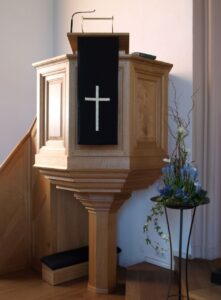With another federal election approaching, we may again be asked to consider whether the Church should have anything to say about politics or whether it should avoid that subject entirely. The notion that Christian teaching and practice should be relegated to a personal or private sphere, while excluded from the public square, does not hold up to scrutiny. This is clear, for example, when considering the lives and teachings of John the Baptist and Jesus.
“And with many other words John exhorted the people and proclaimed the good news to them. But when John rebuked Herod the tetrarch because of his marriage to Herodias, his brother’s wife, and all the other evil things he had done, Herod added this to them all: He locked John up in prison.” (Luke 3:18-20, NIV)
As these verses make clear, John the Baptist did not stop at offering words to the masses. He publicly rebuked the leading political figure for doing “evil,” words that eventually cost him his life. Jesus was likewise critical of Herod, calling him a “fox” (Luke 13:32), and he had especially harsh words for the Pharisees, religious leaders who also wielded a measure of political control. Their reaction to his words and lifestyle was to want to kill him, which they ultimately did.
When church leaders decline to address something because it is “political,” I believe they are motivated by a desire to avoid controversy. And when people say the Church should stay out of politics, what they really want is for the Church to avoid taking a stand they find offensive. Truth always offends those who disregard it.
In retrospect, would it have been better had Christians in Germany been more active in politics as the Nazi party was gaining influence? To ask this question is to answer it. And here is a related question: What evils do we face in our society and in the world today?

Yes, I agree very much with what you are saying. That is why I like Eric Metaxis, Pastor Allen Jackson, and Pastor Jack Hibbs. I follow them on Youtube.